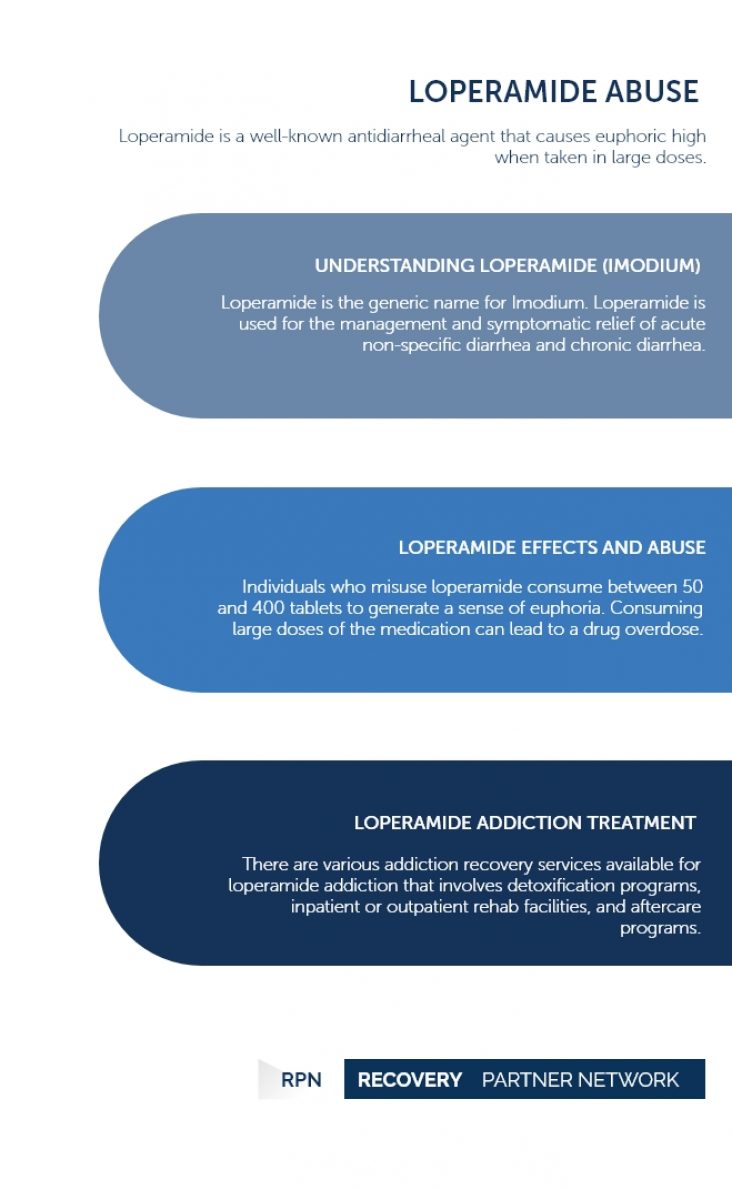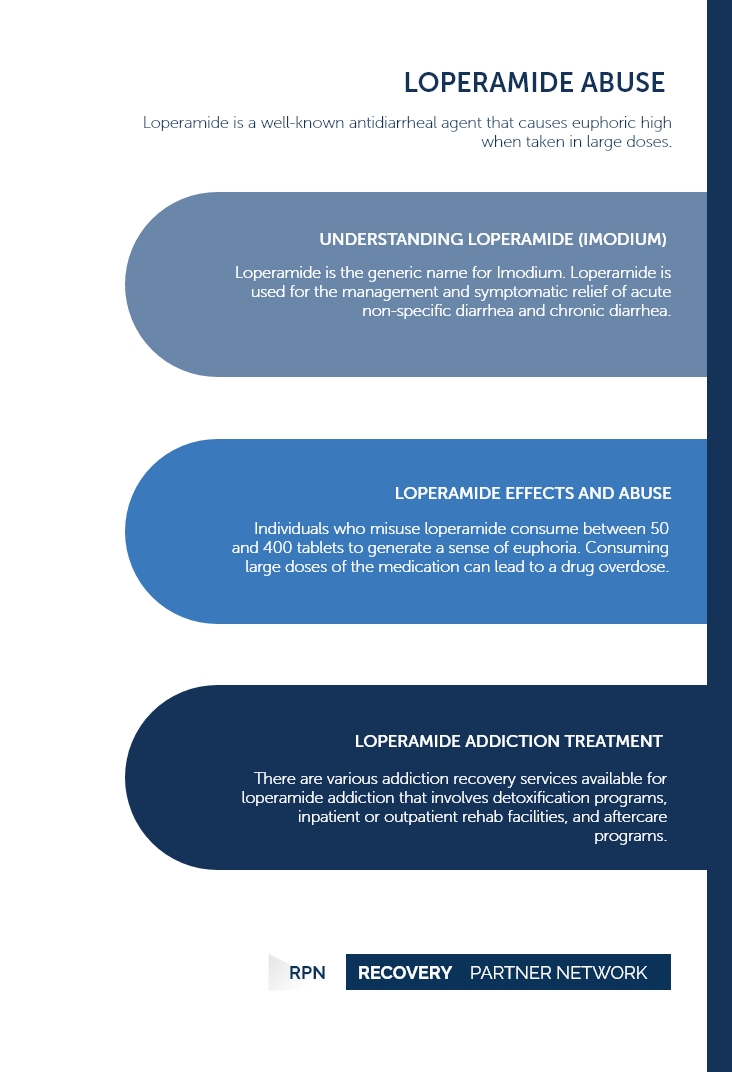Loperamide is a well-known antidiarrheal agent that causes euphoric high when taken in large doses.
Loperamide Abuse
Opioid
- Hydrocodone/paracetamol addiction
- Buprenorphine/Naloxone addiction
- Central nervous system depressant
- Codeine addiction
- Dextropropoxyphene addiction
- Fentanyl abuse
- Hydromorphone addiction
- How Long do Opioids Stay in Your System?
- Hydrocodone addiction
- Kava addiction and abuse
- Loperamide addiction
- Lortab addiction
- Medical prescription opioid
- Methadone addiction
- Morphine addiction
- Norco addiction
- NyQuil addiction
- Opioid use disorder
- OTC substance abuse
- Oxycodone addiction
- Oxycodone/paracetamol addiction
- Opioid epidemic
- Lean addiction
- Pethidine addiction
- Snorting Oxycodone
- Synthetic Opioids
- Tramadol addiction
Loperamide addiction | Table of Contents
Understanding Loperamide (Imodium)
Loperamide is the generic name for Imodium, an antidiarrheal agent available both by prescription and over-the-counter. Loperamide is used for the management and symptomatic relief of acute non-specific diarrhea and chronic diarrhea correlated with inflammatory bowel disease (IBD). The medication is often recommended for decreasing the amount of discharge from ileostomy, which is a surgery that creates an opening for waste to exit the body through the abdomen.
Loperamide functions by slowing down the flow of fluids and electrolytes into the bowel and effectively reducing bowel movements and their frequency. The drug exists as either a pill, a capsule, or a liquid solution to be ingested by mouth.
FAQ
- Is loperamide abused as a drug?
- What happens if I take too much loperamide?
- What is loperamide 2mg used for?
Loperamide abuse has been on the rise within the past ten years. When high doses of the drug are consumed, it can produce effects similar to opioids.
Imodium overdose can lead to symptoms that scale from mild nausea and vomiting to problems with the liver and heart. The FDA has recently introduced a new Imodium warning label, alerting the users that taking a higher dose than recommended may cause cardiac arrhythmias or heart attacks.
Loperamide 2mg Hard Capsules are used to treat two types of diarrhea. The two types have different age limits for adults and children aged 12 and over to treat attacks that can last up to 48 hours.
Loperamide Effects and Abuse
Loperamide helps manage bowel movements and minimize dehydration in patients who have extreme, chronic, or acute diarrhea. In addition to these advantages, the medicine can often produce various harmful effects. These side effects can vary from mild to severe and may involve symptoms such as:
- Flatulence
- Dizziness
- Colic
- Vomiting
- Abdominal cramping
- Headache
- Nausea
- Drowsiness
- Constipation
- Problems urinating
- Dry mouth
The possibility of adverse effects is increased when the medication is abused, especially when large quantities of loperamide are ingested. Drug misuse has escalated dramatically over the last ten years, and several health officials relate this as a direct consequence of the opioid epidemic. Individuals who abuse loperamide do so as it creates similar effects to those of opioids and opiates when ingested at very high doses. Loperamide is an opioid agonist that causes a high by activating opioid receptors in the brain. The medication’s chemical makeup does not allow it to cross the blood-brain barrier at lower doses. Therefore, it would not produce a high unless taken in excessive quantities or in conjunction with other drugs.
Loperamide is an inexpensive medication, in comparison to the price of both illegal and pharmaceutical opioids. The cost of 200 capsules of standard loperamide may cost as low as $10. Individuals who misuse the drug purchase and consume between 50 and 400 tablets in a single day to generate a sense of euphoria similar to that of oxycodone and heroin.
“Loperamide’s accessibility, low-cost, over-the-counter legal status, and lack of social stigma all contribute to its high potential for abuse.”
— William Eggleston, PharmD, Upstate New York Poison Center Syracuse.
Many individuals also use loperamide to self-medicate during withdrawal symptoms correlated with opioid use disorders and to help relieve the physical dependency on opioids. Loperamide misuse is common and problematic that it has been nicknamed the “poor man’s methadone.” The use of loperamide as a substitute for opioids often involves extremely large doses of the medication being consumed and significantly contributing to a drug overdose. Ingesting massive and frequent amounts of loperamide poses a high risk of cardiac arrhythmias and respiratory depression, which may even lead to fatal consequences.
FAQ
- What are the side effects of taking Imodium?
- How quickly does loperamide work?
- Is loperamide safe to take daily?
- How many times a day should I take loperamide?
A few of the common side effects of Imodium may include constipation, nausea, vomiting, headaches, and dry mouth.
Loperamide typically starts working within 1 hour to ease your diarrhea. Most people will have to take Loperamide only for 1 to 2 days but, you may need to take it for longer if you have diarrhea due to intestinal problems such as Crohn’s disease, ulcerative colitis, or short bowel syndrome.
Loperamide is a very safe, non-addictive drug that can be taken at doses of up to 8 capsules (16 milligrams) per day over a long period of time. However, It is not advised to consume more than 16 milligrams a day without seeking medical advice.
Loperamide is usually administered once at the beginning of the treatment and then up to four times a day after each loose stool until the diarrhea is better. It must not be taken more often than every 3 hours or longer than two days.
Loperamide Addiction and Symptoms
There is a widespread misconception that loperamide is safe since it is available over-the-counter. However, this is not true as large doses of any medication can contribute to the development of physical dependency. Prolonged consumption or higher doses of loperamide consumption, even for gastrointestinal or diarrheal pain management, can cause an individual to get accustomed to the medication’s presence in the system and develop an addiction to loperamide.
Once physical dependency has formed, users will experience painful withdrawal symptoms when deciding to quit the medication. These symptoms are similar to that experienced during opioid withdrawal, including:
- Nausea
- Fatigue
- Agitation
- Irritability
- Depression
- Cramping
- Diarrhea
- Heavy sweating
- Muscular aches and discomfort
Signs that show someone may have a loperamide addiction include:
- Spending much of the day thinking about loperamide.
- Constantly using the drug and being unable to quit its use.
- Faking symptoms for obtaining prescriptions of loperamide.
- Taking loperamide after it is no longer required or longer than prescribed.
- Needing more and more of the medication to produce the same effects.
- Substituting the medication for opioids to achieve a sense of euphoria or a high.
- Sudden changes in body appearance, hygiene, and behavior.
Another indication of loperamide addiction is the misuse of the medication in conjunction with other drugs to achieve intense euphoria. Alcohol is widely exploited alongside loperamide since it enhances the effects of both, causing the user to experience more intense intoxication. Engaging in such polydrug abuse increases the risk of a fatal overdose due to cardiotoxic effects.
Loperamide Abuse Statistics
- More Potent: Loperamide is about 40 to 50 times more potent than morphine in terms of CNS depressive and antidiarrheal effects produced.
- 71 Percent: Researchers have found a 71 percent increase in loperamide misuse calls to poison control centers across the US between 2011 and 2014.
- 10x Increase: As per the American College of Emergency Physicians, between 2010 and 2011, there was a 10-fold rise in online blog posts on oral loperamide abuse.
Loperamide Addiction Treatment
All medications, including those marketed as over-the-counter medications, can be unsafe unless they are administered as directed. Using loperamide to get high or ease the symptoms of opioid withdrawal is a form of drug abuse. There are various addiction recovery services available for loperamide addiction that involves detoxification programs, inpatient or outpatient rehab facilities, and aftercare programs. Patients are highly advised to seek medical and professional help when planning to cease loperamide use due to the severity of withdrawal symptoms.
Recovery Partner Network
We aim to educate and empower. If you feel our library of resources does not cover your specific need, reach out to us, and we would be happy to help.
STATISTICS
© Copyright 2026


